The Christmas story is one of forced travel, of uncertainty, of a search for a safe place to stay in an unfamiliar city.
For Joseph and Mary that safe place was a manger in Bethlehem after learning there was no room for them anywhere else. For many Central Americans that place is La 72, a shelter in Tenosique, Tabasco, Mexico.
They stay there because, like Joseph and Mary, there’s no room for them anywhere else. But while Joseph and Mary traveled about 70 miles to Joseph’s hometown of Bethlehem to be part of a census, these Central Americans are traveling hundreds of miles; rather than returning to their hometowns, they’re fleeing from them. To return would be a death sentence.
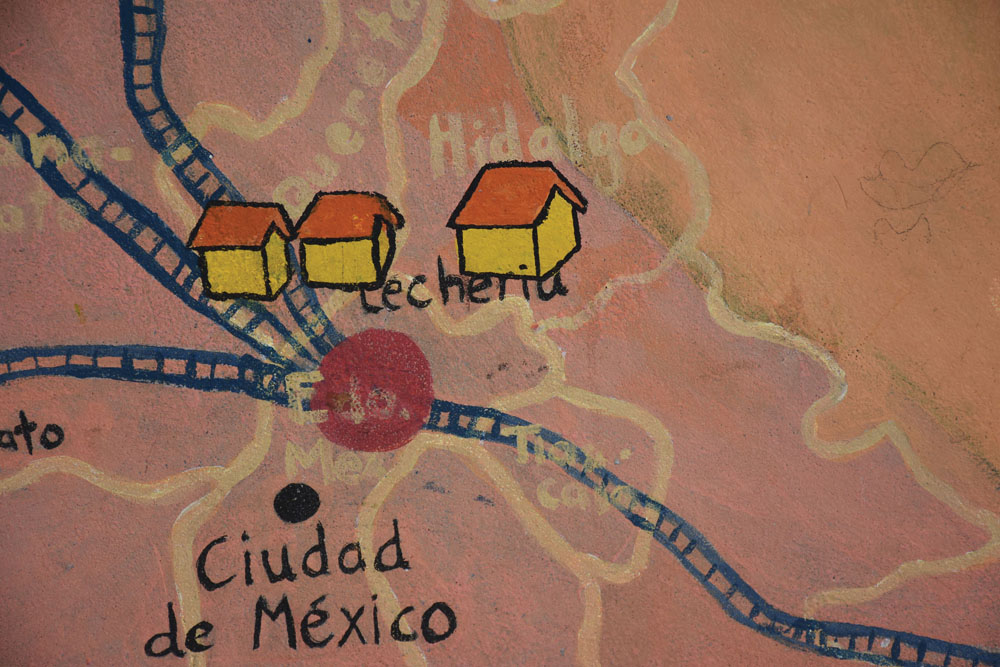
A mural inside a shelter in Tenosique, Mexico depicts train routes. The small houses denote shelters in La Lecheria, an area in Mexico City. Other symbols (a gun, not shown) denote areas where there are assaults.
La 72
There are about 100 people staying in the shelter at Christmas, significantly fewer than usual, as people have left to celebrate the holiday elsewhere. The majority are from Honduras, a few from Guatemala and El Salvador, which comprise Central America’s Northern Triangle Countries (NTC), countries that are among the most violent in the world. Much of the violence is perpetrated by street gangs that murder, extort, and rape with impunity. Their brutality forces an estimated 400,000 people yearly to flee the NTC into Mexico.
Reminders of what residents faced, and face, abound in the shelter, which is named for the 72 Central Americans murdered in Tamaulipas, Mexico in 2010. Holiday garland rings a window adjacent to a large map that shows the rail routes people take through Mexico when they ride the freight trains known as La Bestia (“The Beast”). The map has symbols on it. A dollar sign means there’s a charge to board the trains (the money is collected, often violently, by gangs), a red circle denotes danger, a gun means there have been assaults and robberies.
The warnings are necessary: An estimated 80 percent of people making the trip will be assaulted, and 60 percent of the women will be raped. Nearby, a mural lists some of the massacres that have occurred in Mexico and the mass graves that have been found.
Despite the reminders, despite their fears and the risks they face, people do what they can to celebrate the holiday, remembering what they left behind while hoping for something better.
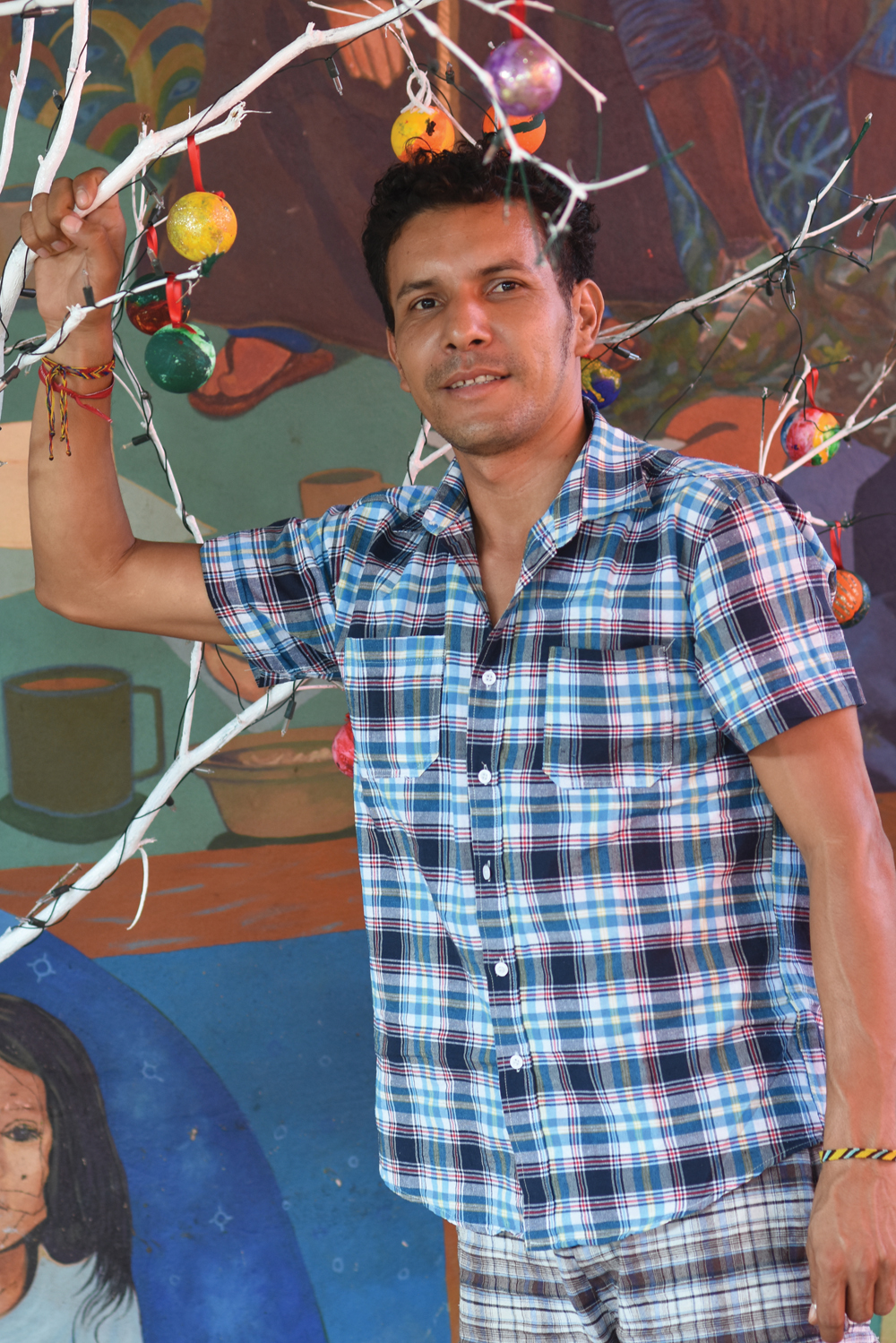
Forty-year-old Alexis Mejia fled Honduras after being threatened by gangs. He left behind his pregnant wife, who gave birth to a daughter while he was away. He has not been able to call home often, because it is too expensive.
What they left behind
Alexis spends most of his days alone, looking pensive. He smiles occasionally as he talks about what Christmas was like for him in Honduras, but it’s a sad smile. “We would visit with family, friends,” he says. “We are used to dancing, being together, going to church . . . it is not just a fiesta, but a time of spirituality . . . a time when we hope. Above all, it is a time of reflection and a time to learn about and love God.”
He fled Honduras after being threatened by gangs and is now hoping to build a life in Mexico. He’s one of the few shelter residents helping the staff decorate for Christmas, perhaps to take his mind off what he’s left behind.
Unlike Joseph in the Bible, who fled with his pregnant wife, Alexis had to leave his pregnant wife and 10-year-old son behind because the journey is too dangerous. “[My daughter] was born while I was here,” he said, adding, “I have to stay here for Christmas. I have no choice.” If he returned home, he’d most likely be murdered.
We’re all migrants
It’s a couple of days before Christmas, and two young girls kneel on a large piece of brown paper coloring in figures of Joseph, Mary, and Jesus. They’re participating in a posada, a Mexican Christmas tradition that depicts the story of Joseph and Mary’s flight. Written in one corner of the paper is, “Joseph, Mary, and Jesus were also migrants.”
“It is what we share in common at Christmas,” said Marianna, a long-time volunteer. “It is when God became man. He was born into violence, no place to live, poverty—like everyone here.”
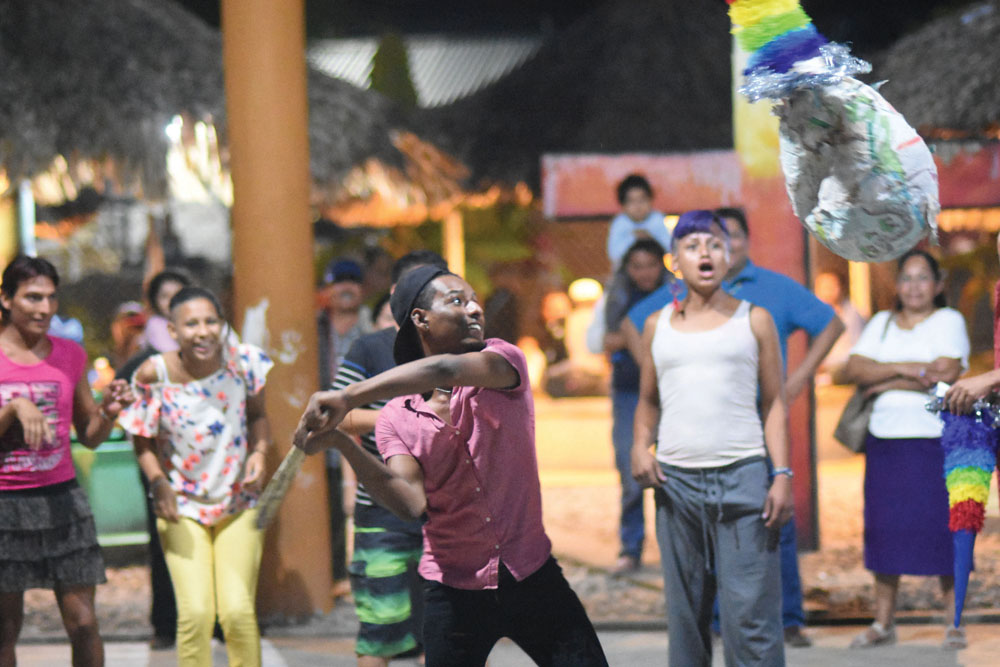
Santiago, from Honduras, takes a swing at a piñata while people cheer him on. The 26-year-old is a member of the LGBT community, which has its own dormitory in the shelter. “I was in the closet in Honduras. I did not tell anyone. I only came out when I got here. It is much safer here,” he says. Piñatas are hung during every posada (the reenactment of Joseph and Mary’s search for lodging). The LGBT community’s own posada is a particularly energetic celebration.
The human spirit
Joseph and Mary fled to Egypt when they learned that Herod had ordered the murder of all male children under 2 years old. Oswaldo fled Honduras when sicarios—hit men hired by drug cartels—tried to kill him and his son. He lifts his shirt to show me the scars on his stomach left by the bullets. He was shot six times and his son four; miraculously, they both survived.
Herod wanted Jesus killed because he saw him as a rival to his power. The cartels wanted Oswaldo and his son killed because they had exposed links between the mayor, police, and drug cartels. “If I want someone killed, [sicarios] will do it for 1,000 pesos or 500 pesos,” he said. “Or for free.”
One night, there was a posada for the men where, after a talk by a friar about the meaning of Christmas, men tied balloons around their ankles and chased each other around the room, trying to pop one another’s balloons. There was a lot of laughter. Later, when I looked at the photos, there was Oswaldo with balloons around his ankle, laughing. Seeing someone who, despite being shot six times, would chase other men, who also have horror stories, laughing and trying to pop their balloons, is further proof that you can’t kill the human spirit.
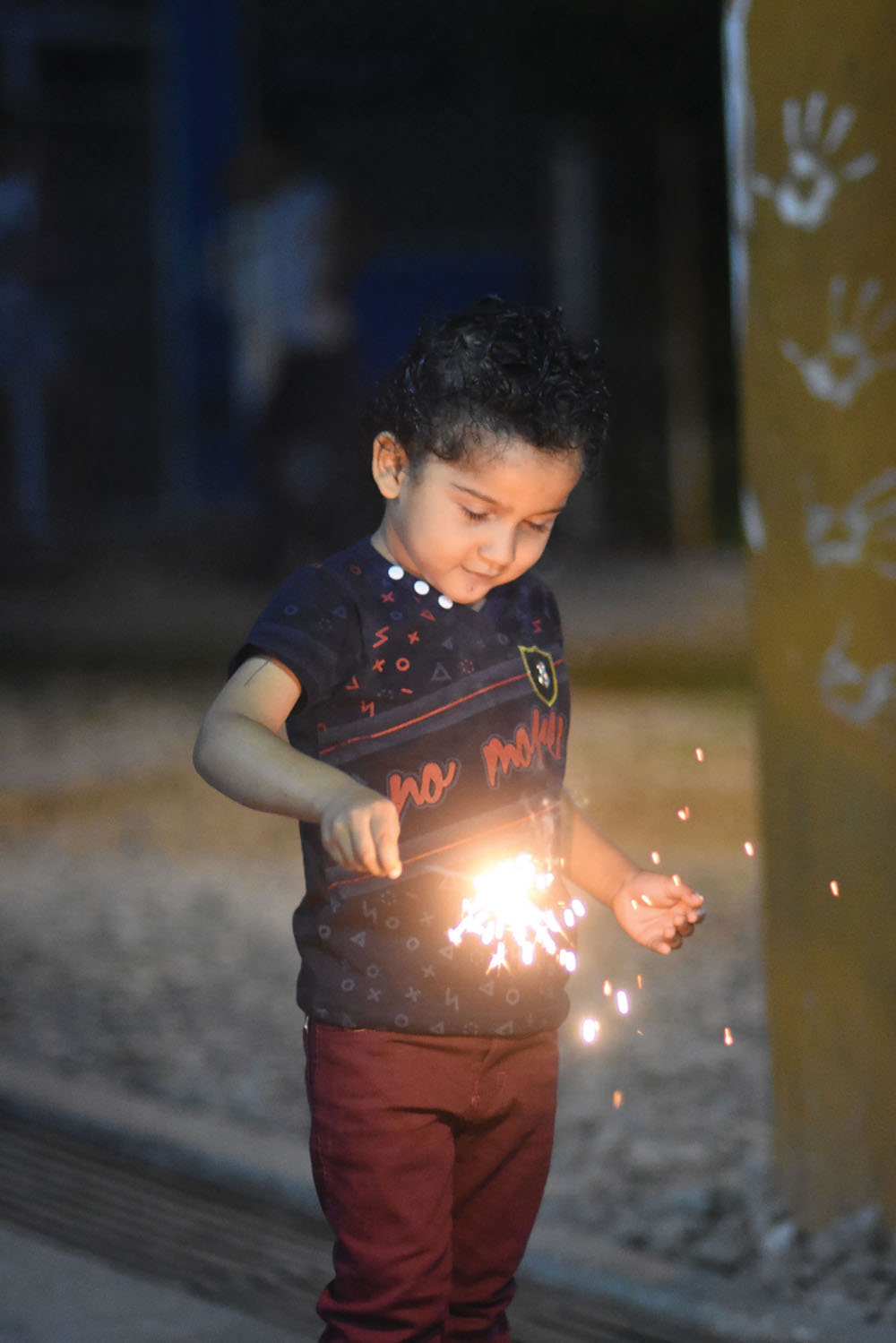
Five-year-old Gabriel plays with a sparkler during the Noche Buena celebration. His grandparents and parents fled Guatemala after his grandfather was shot six times by sicarios (hit men) because he was trying to expose corruption in his city.
Winning the lottery
Three young men arrived at the shelter the afternoon of Christmas Eve, having made their way from Honduras. Like virtually everyone in the shelter, they were fleeing gang violence. Loteria, a game similar to Bingo, was started late that afternoon, and the young men joined it. One of them, Alejandro, won the very first game he played and chose a Rubik’s Cube as his prize. When I asked him how he felt, he smiled broadly and said, “Lucky.”
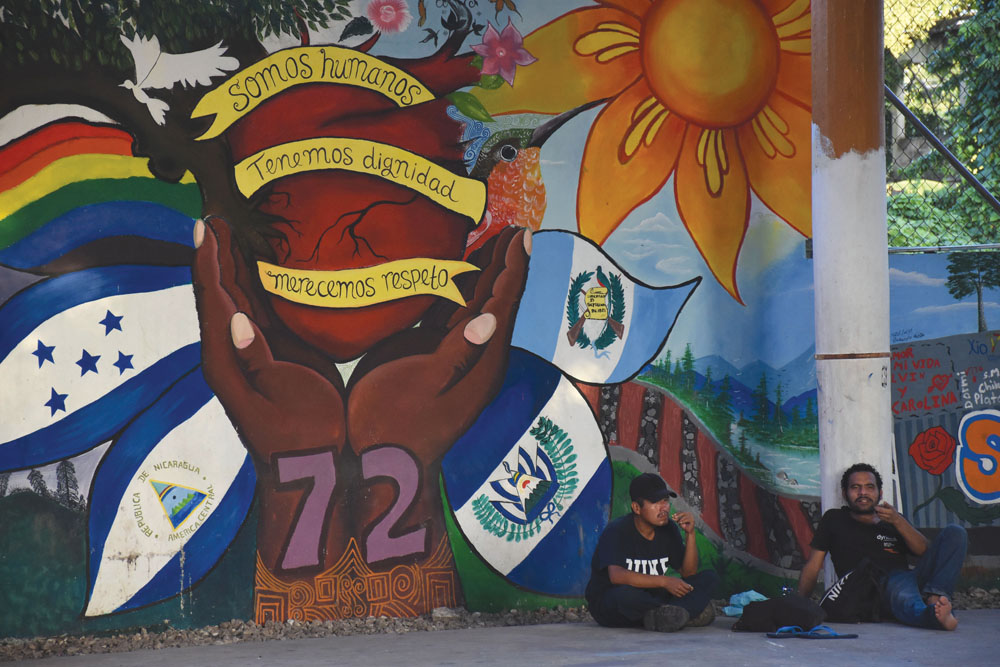
Two shelter residents sit in front of a mural that says, “We Are Humans; We Have Dignity; We Deserve Respect.”
Uncertainty
After spending 20 years in Indiana working as a landscaper, Manuel was deported to Guatemala. He fled when he “saw something” that a gang did. Now he wanted to get back to his family in Indiana. “In the U.S., we had trees and gifts,” he said. “We were like an American family. We were an American family. I want these days to go by fast because it hurts me that my family needs me and I’m not there, at least to give them a hug.”
He was hoping to be able to enter the United States legally but, realizing that wasn’t likely, talked about getting back to his family any way he could. He knew the risks involved. “If you see someone leaving with a backpack,” he said, “they’re heading North. Someone leaves, you don’t know what’s gonna happen to them, if they’re gonna get hurt or caught. Maybe killed.”
One day I saw Manuel scratching something on the cement with a small rock. I leaned in for a closer look. He’d drawn a line. On one side he’d written “Mexico” and on the other, “U.S.A.” When I looked for him my last day in the shelter, he was nowhere to be found. I asked and was told he’d left with his backpack.
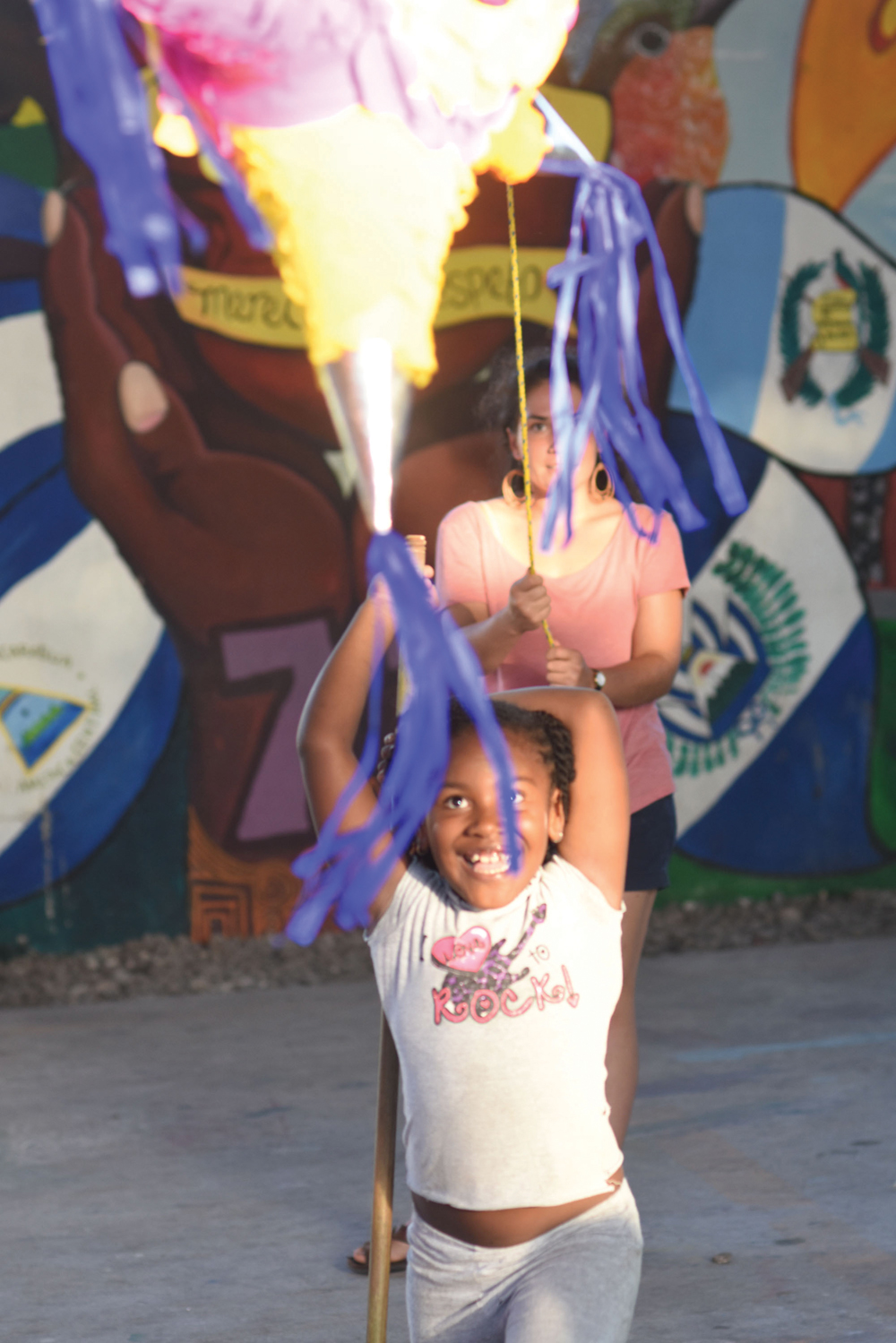
Gabriela Acosta attacks a piñata during the children’s posada, December 22. Children take turns hitting the piñata until it brakes and spills out candy. Gabriela traveled with her mother and they, like the majority of people at La 72, are from Honduras.
Faith
Pierre, a shy 16-year-old, left Honduras when he was threatened by a violent gang. “I cannot be in my country,” he said. “If I were, they would kill me.” For him Christmas was “a time to hope. I have hope because of faith.” When he was asked how he could have faith given all he’s faced, he said, “If you have faith in God, you can do anything.” He was traveling alone through Mexico and said that, although he was afraid, “[God] is with me. Even when I am alone, I am not really alone.”
Like the three migrants in the Christmas story, Central Americans, and millions like them around the world, are seeking a safe place to stay in a world where they’re not wanted. And, like those three migrants, they’ll continue to travel and strive and hope because, really, they have no choice. But it’s never easy.
Maria Norma was reluctant to say much about why she and her young daughter had to leave Honduras, saying only it was because of the gangs. As we talked, she seemed to always be on the verge of crying. When we were finished, she couldn’t hold back and began to quietly cry. I asked her why. “Because I cannot go home,” she said.
Header image: Children color figures of Joseph, Mary, and Jesus. The phrase written in black on the paper is, “I want documents and to live in Mexico.” The girl in pink writes, “I want to arrive safe and sound in the United States with my brother and my mother.” All photos courtesy of Joseph Sorrentino
This article also appears in the December 2018 issue of U.S. Catholic (Vol. 83, No. 12, pages 22–27).


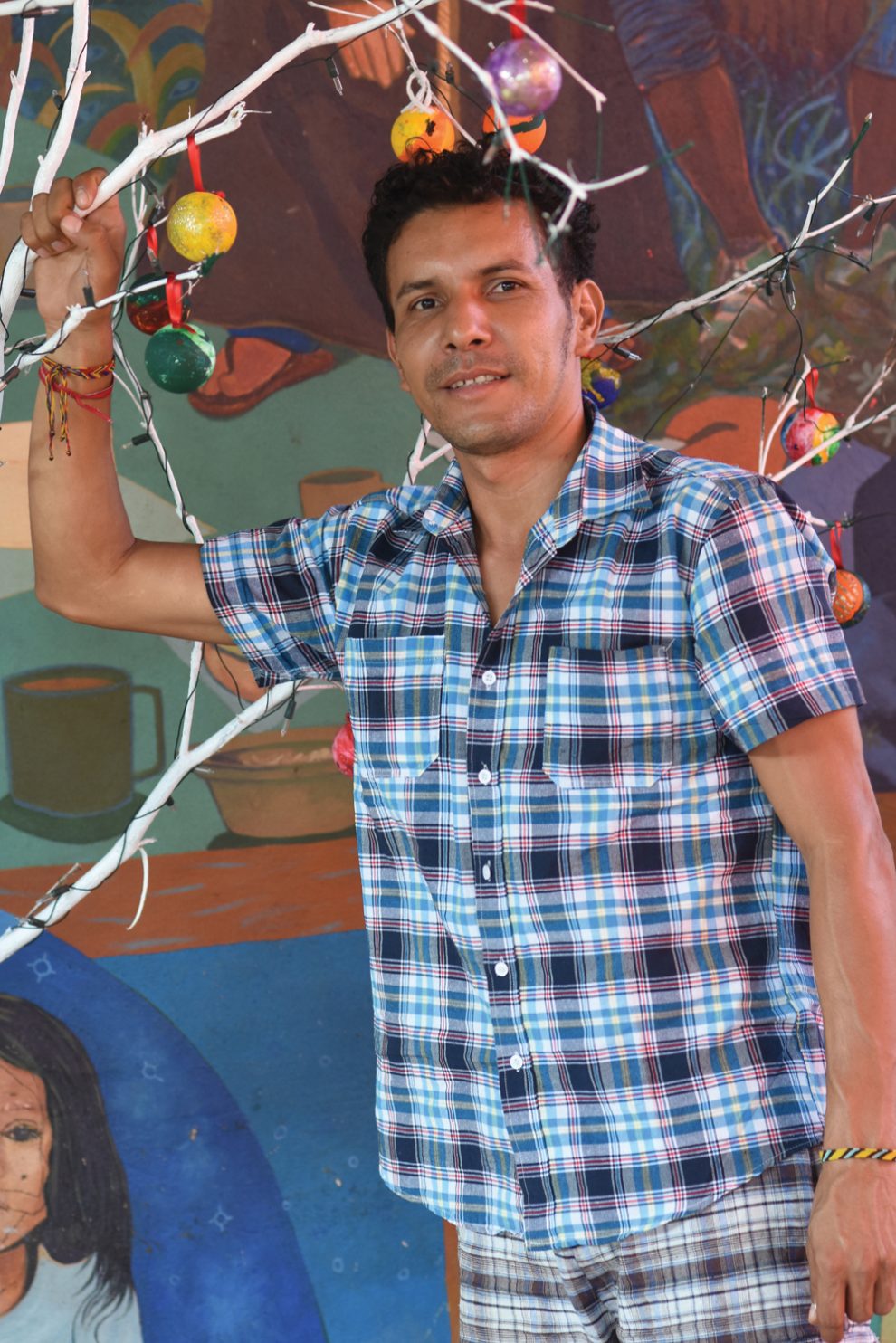



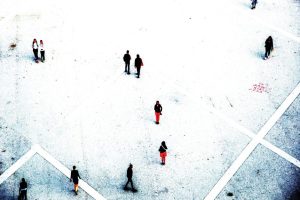
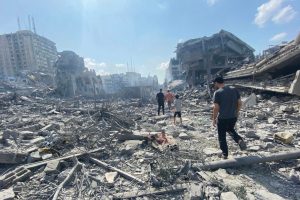
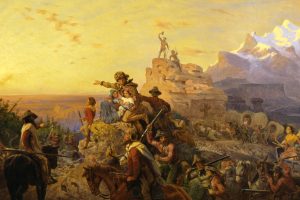





Add comment